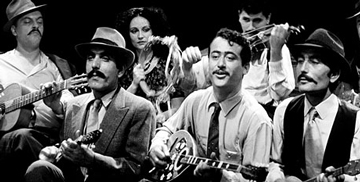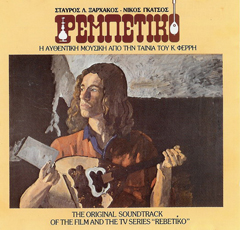
 |
|
|
|
Here in America one can quickly learn about average commercial film fare from places like Greece, Turkey and the Near East by seeing what's being sold at visiting ethnic markets and video stores. Chances are you'll find cheaply made local versions of familiar genres, promising lots of sex and violence. When a filmmaker from a small country produces a hit, it tends to be a very big deal, at least on the local level. A writer-director committed to expressing Greek values and history, Costas Ferris made the interesting Rembetiko as both a feature and a longer television miniseries, and also later adapted it as a play. Facets Video's new special edition is the miniseries version, which adds forty minutes of new footage to a disc released two years ago. Rembetiko is an attempt at a national epic as told through music. The story spans the years 1920 through 1956 and charts the political fortunes of Greece through a specific genre of music called Rembetiko. Referred to as "The Greek Blues" in the disc's promotional copy, Rembetiko appears to be an earlier strain of the more modern Bouzouki music, named after the mandolin-like Greek string instrument. Casual American audiences will associate the modern form with the famous soundtracks to Never On Sunday (Manos Hajidakis) and "Z" (Mikis Theodorakis). The original Rembetiko (or Rembetika, or Rebetiko, or Rempetica), we are told, uses an often mournful singing accompaniment, and expresses the plight of the millions of poor Greeks and Armenians forced to emigrate from Turkey in the early 1920s. They became a poor subculture in Greece, often associated with despair, broken homes and drug use. 
Rembetiko is a multigenerational tale that centers on several real-life personages, starting with Marika Ninou, a revered Greek singer. Marika (as an adult, Sotiria Leonardou) was born in Smyrna, Turkey but raised in a smaller Greek immigrant town. The film is an almost unbroken series of musical performances, with just enough plot to show how Marika's unfortunate life contributes to her patchy career as a singer. Director Ferris injects brief B&W montages of news film every time the story jumps ahead four or five years. Marika is a child when her mother Andriana (Themis Bazaka), a Rembetiko singer, is killed. The family has no regular income. Marika's father Panagis (Nikos Dimitratos) relies on handouts, especially from the established club owner Thomas (Giorgos Zorbas), who moves from fondling Andriana to having daily sex with her. Several years later the teenaged Andriana runs away with a traveling magician and appears in his act. When she becomes pregnant he leaves her, and she returns to her hometown. Her best friend Yorgis (Michalis Maniatis) plays violin and swears to be like a brother to her. Rembetiko musician and writer Babis (Nikos Kalogeropoulos) encourages Marika to sing, and she becomes a hit. But Babis doesn't return her love, and takes on a succession of other female performer-lovers. The story moves ahead to the 1930s, when Rembetiko music was for a while outlawed as a supposed "source" of crime; the parallels with Tango in Argentina are interesting. Yorgis is imprisoned along with his friend, a dancer. Babis entices Marika to Athens and more upbeat music. When the war comes Yorgis is freed to fight and spends several years away. Thomas the club owner is forced to collaborate with the German occupiers; the band eventually returns to its Rembetiko roots. More friends are lost in the Civil War that follows the Allied victory. In the 1950s Marika is rejected by her daughter, who has become a club dancer, and goes to Chicago for a time before returning to find that Rembetiko has gone out of fashion. The real reason to see Rembetiko is the music, which is both exciting and soothing; the massed sound of all those stringed instruments is very impressive. We're told that composers Hadjidakis and Theodorakis re-popularized Rembetiko and Bouzouki in the 1960s, and it's nice to hear this very different sound than the later pop and rock-influenced songs we often hear. Some of the instrumental underscore by Stavros Xarhakos is particularly beautiful and I'm saddened to not find its soundtrack (pictured) readily available online. 
Sotiria Leonardou is captivating as the dark beauty Marika; she sustains a rather sketchy character through scores of emotional crises, from discovering the suicide of a competitor to realizing that the love of her life is going to remain unrequited. I either blinked, or some key dialogue was missing but I got the notion that Marika's dear and faithful friend Yorgis might be gay -- throughout the show we wish they'd stop suffering separately and get together. The script by director Ferris and actress Leonardou is to be applauded for avoiding obvious clichés. Romantic problems do not end in violence or revenge, the Germans do not threaten the heroine directly, etc. The movie nods in the direction of commercial appeal with frequent nudity and occasional close-ups of (clothed) female rear ends -- Ferris must be an enthusiast. But a basic respect for the characters is maintained. Facets Video's DVD of Rembetiko was apparently licensed from a Greek firm on a take-it-or-leave-it basis. The master provided looks fairly presentable and no major problems are evident at first. Facets begins with a disclaimer card that seems unnecessary until we realize that the film's original 1:66 aspect ratio has been transferred in the craziest way imaginable. A 1:33 "TV" setting often makes everyone look too "skinny", but in 16:9 widescreen mode things can also seem a bit stretched. What's more, the scan never settles down. Some later scenes start to look too stretched, and the 1:33 setting looks better for them. Then it changes again. I've never seen anything like this. The movie has good removable subtitles. The music seems to play at a correct speed, which leads me to theorize that the master was originally a 25 fps PAL transfer later converted and time-adjusted to NTSC 24 fps. The mono audio sounds okay, if a bit low in volume. The problem is that after a few minutes the track begins to go slightly out of sync, and remains so for the rest of the presentation. This must be what the disclaimer is referring to: it's not that the movie could not be transferred better, but that the only transfer available to the company had problems. So we're seeing yet another so-so transfer of a foreign rarity, that is "the best quality we could bring you". The disc comes with a short booklet containing a couple of text pieces explaining the musical background of the film and a very short discussion of director Costas Ferris. I'll be putting this disc up and listening to it again for sure, as I've not heard music like this before and instantly took a liking to it. But as the last of the film's credits roll up we see a Dolby Digital logo, indicating that Rembetiko in the theaters was most likely a polished presentation with stereo audio: it won the Berlin Film Festival's Silver Bear Award. We wish that the Greek owners would invest a little in their proud product to allow it to be better appreciated. 1
On a scale of Excellent, Good, Fair, and Poor,
Rembetiko rates:
Footnote:
1. Argentina had a flourishing film industry in the 1930s and 40s, turning out many musicals featuring legendary singers now heard only in surviving, often poor-quality audio recordings. The snippets I've seen of Argentine movies have all looked wretched, as if no mechanism existed (or nobody bothered) to preserve a negative or maintain a viewable print. Remember, this is a country where somebody knew about A COMPLETE PRINT OF METROPOLIS for seventy years and didn't bother to preserve it until it all that remained was a dupey 16mm reduction print. What a loss! Why didn't you tell the world, eh?
Reviews on the Savant main site have additional credits information and are often updated and annotated with reader input and graphics. Also, don't forget the 2010 Savant Wish List. T'was Ever Thus.
Review Staff | About DVD Talk | Newsletter Subscribe | Join DVD Talk Forum |
| ||||||||||||||||||